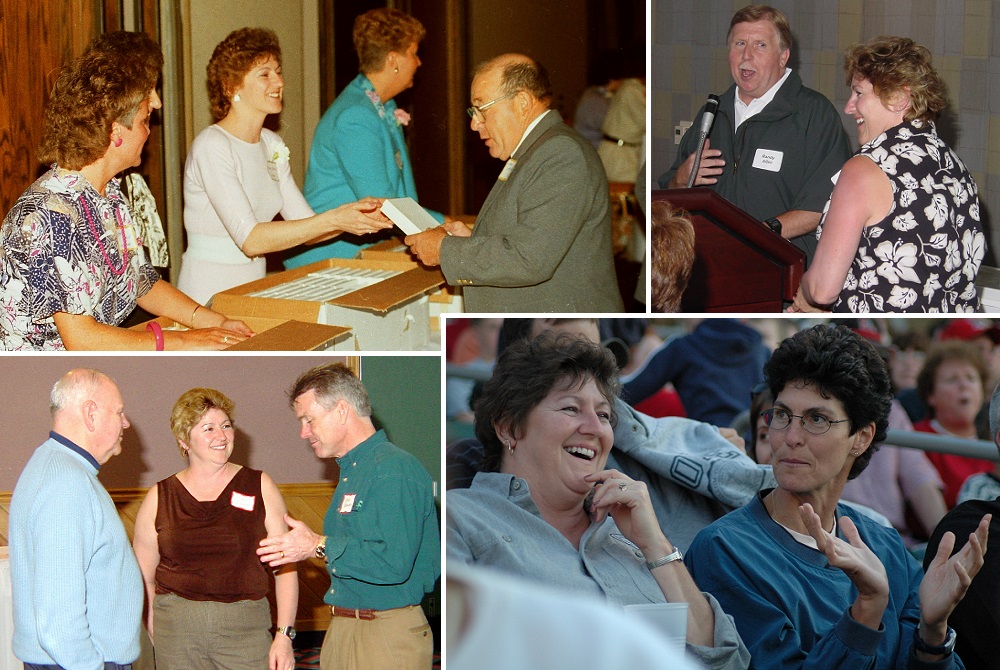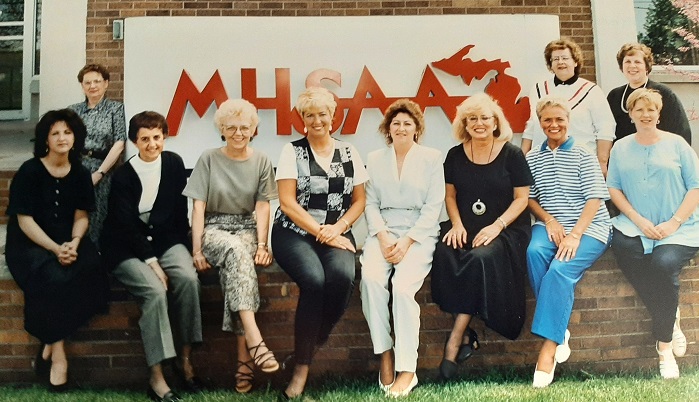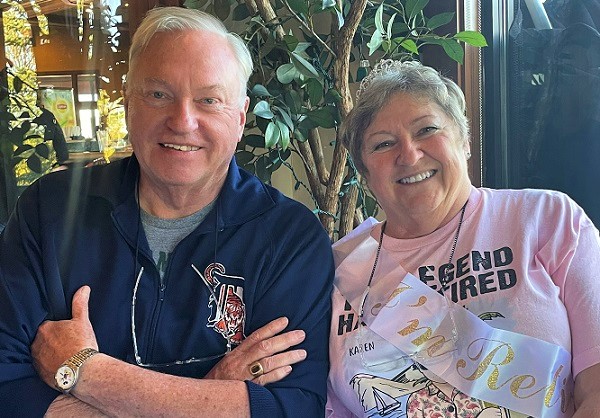
Rep Council Wrap-up: Spring 2020
May 8, 2020
By Geoff Kimmerly
Second Half editor
The addition of seeding at the Regional level in ice hockey and adjustments to provide byes for top-seeded teams in basketball and soccer were among the most notable actions taken by the Representative Council of the Michigan High School Athletic Association during its annual Spring Meeting on May 4.
The Spring Meeting of the 19-member legislative body of the Association’s more than 1,500 member schools is generally the busiest of its three sessions each year. The Council considered 32 committee proposals and dealt with a variety of eligibility rule, postseason tournament and operational issues. As with the Council’s Winter Meeting in March, the Spring Meeting was conducted remotely to keep with social distancing required by the COVID-19 pandemic.
Beginning with the 2020-21 school year, ice hockey will employ a seeding process to place the top two teams in every Regional on opposite sides of that bracket, guaranteeing those two teams could not play each other before the Regional championship game. The two teams are to be seeded in each Regional using the Michigan Power Rating computer formula based on regular-season results against other MHSAA Tournament-eligible teams and opponents’ strength of schedule, the same system used in basketball and soccer and as one of multiple methods to seed in boys lacrosse. (Games against out-of-state or non-MHSAA opponents do not count in the MPR formula.) The MHSAA will draw all ice hockey brackets 15 days before the start of Regional play. The addition of hockey seeding was proposed by the MHSAA Hockey Committee.
The Council also adopted a change to seeding to take affect for hockey, basketball and soccer to provide any existing byes to the #1, and then #2 seed, in that order, if multiple byes are part of a bracket. The draw process then will continue to place the remaining teams on the bracket based on a randomly-selected order determined earlier in the season.
Similar rules changes in football and basketball approved by the Council and recommended by the MHSAA committees for those respective sports aim to create more opportunities, especially for programs struggling to field teams at multiple levels. In football, while an athlete may still play only four quarters in one day, that athlete may play in up to five quarters per week. In basketball, an athlete may compete in up to five quarters per day, during no more than three dates per week and 20 dates per team or individual. Both changes will allow athletes to contribute to both varsity and subvarsity teams simultaneously, potentially bolstering numbers and opportunities to retain those squads.
The Council also took action on a number of MHSAA Handbook regulations requiring adjustment because of the COVID-19 pandemic and disruption it has caused to Michigan high school athletics. Notably, the Council voted to waive the 2020-21 pre-participation physical exam requirement for athletes who received one during the 2019-20 school year, although they are still required to fill out and sign the MHSAA Annual Sports Health Questionnaire. The Council also authorized schools to make decisions on multiple summer matters, including an opportunity for athletic directors to request a waiver from the MHSAA to wear school competition uniforms during events that are school-sponsored and designed to recognize graduating 12th-graders. Additionally, the Council voted to give schools the opportunity to waive the annually-required week-long period of no summer activity, if they choose to do so.
Here is a summary of other notable actions taken by the Representative Council at the Spring Meeting, which will take effect during the 2020-21 school year unless noted. Additionally, three sport changes were approved by the Council during its Winter meeting in March and not yet publicized; those too are noted below.
Regulations
• The Council approved a change allowing teams in sports governed by MHSAA summer competition limits – basketball, football, ice hockey, lacrosse, soccer and girls volleyball – to participate against all opponents present at out-of-state summer events. MHSAA member schools must continue to abide by the MHSAA travel limit – traveling only to events that are hosted either in bordering states/provinces (Illinois, Indiana, Ohio, Ontario and Wisconsin) or within 300 miles one way. MHSAA member schools now may participate at those events against out-of-state teams that exceed the travel limit by traveling more than 300 miles to the event site.
Sport Matters
• In baseball, the Council approved a Baseball Committee recommendation to adopt a suspended-game policy stating that any game called before it reaches regulation, or when the score is tied, is suspended with play to pick up at a later time from that point. However, if both schools agree, a game called prior to regulation may be replayed in its entirety.
• Also in baseball, during its Winter meeting, the Council approved a Baseball Committee recommendation renaming the “Super Regional” level of the MHSAA Tournament as the “Quarterfinal” level – with trophies and medals to be presented to both Regional champions after the day’s Regional Finals are completed and before the day’s Quarterfinal matching up those two teams. The Council also adopted at the Winter meeting a tournament schedule that during even-numbered years will see Semifinals for Divisions 2 and 4 played on Thursday and Divisions 1 and 3 on Friday. The Semifinal schedule will flip during odd-numbered years.
• The Council approved a series of Girls Competitive Cheer Committee recommendations. High school athletes now are allowed to transition to stunts or loads from the flatback position. Also at the high school level, bases will be allowed to rotate or move while a flyer is in the inverted position (in a static inversion), and to provide for the allowance of additional flairs at the point of static inversion.
• Also in cheer, the Council approved a Committee recommendation requiring three safety judges (instead of two) and five panel judges at MHSAA Regional events.
• In football, the Council approved a Football Committee recommendation extending the running clock when a team leads its opponent by 50 points to both the first and second halves of a game; the 50-point running clock stops only for player injuries and previously was employed only during the second half. The 35-point running clock employed during the second half, with stoppages also for penalty enforcement, scoring plays and called timeouts, will remain in effect if the differential dips below 50 and until it reaches 50 points again.
• Also in football, the Council approved a Committee recommendation allowing schools 15 summer dates of non-mandatory contact with an unlimited number of players (wearing helmets only). Schools may use these dates as they see fit, but of these 15 only seven dates may be used for 7-on-7 competition against other teams. This also eliminates the previous allowance for a camp.
• The Council approved another change in hockey to improve safety, adopting a Hockey Committee recommendation requiring all members of a coaching staff to wear HECC-certified helmets while on the ice for practices or games.
• In alpine skiing, the Council approved a Ski Committee recommendation that will allow athletes who qualify for an MHSAA Final in one discipline (giant slalom or slalom) during Regional racing to compete in both disciplines at the Finals level.
• In soccer, the Council approved a recommendation from the Soccer Committee to allow girls soccer athletes to compete in scrimmages at a maximum of two college ID camps during the spring girls soccer season, when these ID events generally take place.
• A pair of changes were adopted for swimming & diving, one affecting each group of athletes. The Council approved a Swimming & Diving Committee recommendation allowing swimmers to wear caps reading “State Team” during both regular-season and postseason competition. For diving, the Council approved a Committee recommendation to designate the number of qualifiers from each Lower Peninsula Regional to be in proportion to the number of entries at those respective Regionals in each division. This will allow Regionals with larger numbers of participants to contribute more Finals qualifiers, while eliminating the possibility that a Regional could send all entrants to the Finals regardless of performance because only 12 participate at that site. Each division will continue to advance 36 divers total to the MHSAA Finals.
• In tennis, the Council approved a Tennis Committee recommendation to play the MHSAA Final two-day tournament on Friday and Saturday unless there is a conflict with the host facility. In that case, that specific Final would be scheduled for Thursday and Friday.
• During its Winter meeting, the Council approved a Classification Committee recommendation that adds girls and boys tennis to the group of sports that schools may play as cooperative programs – with Executive Committee approval – if their combined enrollments do not exceed 3,500 students. The Council will reexamine this allowance after its first two years.
Junior High/Middle Schools
• The Council approved a Junior High/Middle School Committee recommendation to conduct MHSAA-sponsored cross country Regional meets for junior high/middle school athletes at eight sites across the state, based on “zones” currently designated by the MHSAA. These Regional meets will begin with the 2021-22 school year.
• The Council also approved a Girls Competitive Cheer Committee recommendation to allow junior high/middle school teams to participate in three competitions per week (instead of two) as long as one of the three is conducted on a non-school day or a day not followed by school.
Officials
• The Council approved a series of recommendations from the Officials Review Committee. Of particular note, coaches and athletes ejected from competition now are required to complete an online sportsmanship course from the National Federation of State High School Associations (NFHS) before returning to competition.
The Council also discussed various other topics, including possibilities for presentation during this fall’s Update Meeting statewide tour, and took action to clarify Handbook language regarding a few eligibility scenarios. The Association’s $11.5 million budget for the 2020-21 school year also was approved.
The Representative Council is the 19-member legislative body of the MHSAA. All but five are elected by member schools. Four members are appointed by the Council to facilitate representation of females and minorities, and the 19th position is occupied by the Superintendent of Public Instruction or designee.
The MHSAA is a private, not-for-profit corporation of voluntary membership by more than 1,500 public and private senior high schools and junior high/middle schools which exists to develop common rules for athletic eligibility and competition. No government funds or tax dollars support the MHSAA, which was the first such association nationally to not accept membership dues or tournament entry fees from schools. Member schools which enforce these rules are permitted to participate in MHSAA tournaments, which attract more than 1.4 million spectators each year.

Jackson's Imprint on MHSAA Stretches 45 Years, Across 4 Executive Directors
By
Geoff Kimmerly
MHSAA.com senior editor
October 5, 2022
First impressions can be significant, as many a saying goes. And Karen Brown unknowingly provided one in 1978 that helped affect the course of athletics in this state over the next 40-plus years.
A Michigan State University student named Karen Leinaar had shown up at the Michigan High School Athletic Association for a meeting about a 5K road race she was planning that was unrelated to the MHSAA except that the building provided a good meeting place – and Brown, just a year out of high school, was the first person to greet her at the old Trowbridge Road headquarters.
Seeing someone her age immediately made Leinaar more comfortable. She ended up returning to that office several times over the years, registering as an MHSAA game official while still an MSU student and then starting a career in 1982 that has included nearly 40 years as a high school athletic director and two decades of shaping policy as part of the MHSAA Representative Council.
That’s the kind of impact that’s emanated from Karen Jackson, formerly Brown, and over the last 45 years as assistant to four of the five executive directors during the MHSAA’s 98-year history. Jackson finished that run with her retirement Friday.
“She was always one that would welcome you, and whether you walked into the office or called on the phone, she always had an answer that would calm you down or provide you with the information you needed,” said Leinaar, who currently is serving as interim athletic director at Frankfort High School in addition to her duties as executive director of the Michigan Interscholastic Athletic Administrators Association.
“I remember initially calling and needing something from Mr. Norris – it was always Mr. Norris – and she could answer the question,” Leinaar added, referring to retired MHSAA executive director Vern Norris, who served in that role from 1978-86. “You didn’t want to talk to scary Mr. Norris – Vern was a wonderful man, but he was like the superintendent or principal. Karen always had the answer. … It was always that smile that made you feel like you were more than welcomed, wanted in the office, and everything is going to be OK.”
 Jackson began at the MHSAA in June 1977, two days before her graduation from long ago-closed Harry Hill High School in Lansing.
Jackson began at the MHSAA in June 1977, two days before her graduation from long ago-closed Harry Hill High School in Lansing.
Her high school sports career amounted to about half a season on the Hill varsity volleyball team as a sophomore before she had to switch gears to begin working for the Lansing Regional Chamber of Commerce as part of a school co-op program.
Jackson graduated as a co-valedictorian of Hill’s Class of 1977. Despite her academic standing, she hadn’t received much guidance at school on the possibility of college. But she had a job offer from the Chamber – and also had heard from grade-school friend Deborah Norris (Vern’s daughter) about an opening at the MHSAA.
The MHSAA was offering more money, and Jackson was hoping to buy a car – and so at 18, she became the secretary for executive director Allen W. Bush.
The title has changed over the years, from secretary to the executive director, to executive assistant, to senior executive assistant. The MHSAA’s administrative processes obviously have changed, mostly because of technology, from everything done on paper and through the mail to just about everything conducted digitally over the internet.
But many of Jackson’s most important duties at the end of her tenure resembled those she was hired to carry out nearly half a century ago.
Setting Exemplary Expectations
Bush retired a year after Jackson began, and she then assisted Norris for his eight as executive director. She served with Jack Roberts through his 32 years as executive director from 1986-2018 and then for these first 3½ under current director Mark Uyl.
She was considered the “baby” of the MHSAA staff during her first 12 years, until she turned 30 and her support staff teammates declared she wasn’t the baby anymore during a Christmas party serenade. Just about 33 years later, she’s leaving as one of two people left who worked in the old offices before the MHSAA moved to another East Lansing headquarters at Ramblewood Drive in 1996.
School sports happen thanks to a Karen Jackson or two in every community -- people who provide the unseen support that makes these programs possible every day.
For the last 45 years, she’s provided a consistent anchor for service to 1,500 schools and millions of student-athletes across Michigan.
 “She’s shaped so much of what we’ve done,” said MHSAA assistant director Kathy Vruggink Westdorp, who joined the staff during the 2003-04 school year after more than two decades working for Grand Rapids-area schools. “Her service to schools was imperative to what she was doing, and it was a valuable part for our membership. Hers was such a dedicated service, such an exemplary service – finding solutions, to do what’s needed.”
“She’s shaped so much of what we’ve done,” said MHSAA assistant director Kathy Vruggink Westdorp, who joined the staff during the 2003-04 school year after more than two decades working for Grand Rapids-area schools. “Her service to schools was imperative to what she was doing, and it was a valuable part for our membership. Hers was such a dedicated service, such an exemplary service – finding solutions, to do what’s needed.”
There are file cabinets and libraries and hard drives at the MHSAA office, the contents of which are known by only a handful of people on Earth – and Jackson perhaps the most as she did most of the sorting and maintaining of those files over the years.
For a 1996 Lansing State Journal feature on the MHSAA’s support staff, Jackson (then Yonkers) explained “there are always new challenges, new issues and controversies. It never gets boring. In the past 19 years, we’ve slowly shifted from dealing with athletic administrators, principals and superintendents to dealing with legislators, attorneys and courts.”
The last 25 years has seen much of the work swing back to providing service directly to schools. And Jackson’s mind has become part MHSAA library and part card catalog of where to find those few snippets she might not recall immediately from the last half century.
“I guess what I’m proud of is being able to find things, to know where to find things and how to find things that other people don’t,” Jackson said. “Yes, the technology has changed everything. … We used to have more schools – they used to have 40-some Detroit public schools – and there was a whole era of (litigation), but it’s calmed down now.
“I liked what I did, and it kept me on my toes – that’s for sure.”
The MHSAA is rooted in its responsibilities as a championship and eligibility rules maker, and Jackson was involved in just about every communication in those areas during her time. Tournament changes are made at Representative Council meetings, and she’s reported the minutes for at least 150 of those, including piles of special sessions as the MHSAA managed sports through the COVID-19 pandemic. Eligibility waivers are requested at Executive Committee meetings, and she’s prepared somewhere north of 505 sets of minutes for those monthly sessions even as those agendas have grown in content substantially over the years.
Then there’s all of the correspondence from those four executive directors – all with the initials “kb” or “kj” to go with “AWB” or “VLN” or “JER” and “MU.” She also was in charge of MHSAA election ballots for 35 years, served as the lead organizer of cooperative programs, helped with football tickets for a time and briefly was part of the program-selling crew at early Football Finals at the Pontiac Silverdome.
“I think I’m pretty lucky, being on the Council and Executive Committee, that I’ve been able to work with her a lot. And most athletic directors, they may not even know who she is because they may not have contact with her or do anything with her – but she’s obviously been the unsung hero of that office,” said Vic Michaels, who serves as director of physical education & athletics for the Archdiocese of Detroit and has served on the Representative Council since 2003.
“She just does so much that you don’t really know about, especially with the Council. Whenever I need anything, Karen’s the one I call. She is the history, really. She’s the keeper of that.”
Unprecedented & 'Never to be Replicated'
A longtime co-worker of Jackson, Shirley Hytinen, retired in 1998 after just a few months more than 43 years. She too had worked for four executive directors, as she began in 1955 during the Charles E. Forsythe era.
Jackson surpassed Hytinen’s tenure a few years into Uyl’s, and can readily recall some of what stood out from all four directors she’s assisted.
Bush was “really stern” – he had served in the U.S. Marines – and she said he didn’t smile much until the day he announced his retirement, when it was “like a switch turned. He was smiling and happy and joking around.”
Norris was “the sweetest guy in the world.” Jackson had bought her first house in her mid-20s and was preparing to move in with only her dad and his motor home to assist, when Norris showed up to help at 7:30 a.m. that morning to provide another set of hands.
Roberts is known by Michigan administrators and national colleagues for his writing, and Jackson said jokingly she still “cringes” when she sees a yellow legal pad. She was an important proofreader and spent the majority of her career serving with her desk just a few paces away from that of the recent National Federation Hall of Fame selection, and she attended his induction this past summer and San Antonio.
 Roberts pointed out that during the 1980s, the MHSAA would conduct nine Executive Committee meetings, each averaging fewer than 10 requests for waivers. By the end of his 32 years, there were 11 Executive Committee meetings annually – with approximately 50 waiver requests presented on average. Still, he and Jackson were able to process the meeting minutes and continue to distribute those decisions within 24 hours.
Roberts pointed out that during the 1980s, the MHSAA would conduct nine Executive Committee meetings, each averaging fewer than 10 requests for waivers. By the end of his 32 years, there were 11 Executive Committee meetings annually – with approximately 50 waiver requests presented on average. Still, he and Jackson were able to process the meeting minutes and continue to distribute those decisions within 24 hours.
“Over the more than three decades that Karen and I worked together at the MHSAA, the work became increasingly more voluminous and complicated – and Karen kept finding ways to increase our efficiency and maximize our output,” Roberts said.
Like Norris when Bush was executive director, Uyl had been part of the MHSAA staff under Roberts since 2004 before eventually moving into the corner office. After those first 15 years together, Uyl knew what a valuable person he had just a few yards away to assist in his transition, and “he just says to do this” and allows his staff to run with it, which Jackson enjoyed.
Her duties have been shifted confidently, mostly to Jamie VanDerMoere, another longtime administrative assistant who is best-known to Michigan school sports people for her leadership with the annual wrestling championship tournaments.
Jackson recently was married to Jim Jackson, and they have plans as they close in on their first anniversary – they’re hoping to travel to Italy at some point and also The Masters in Augusta, Ga., next spring. “I’m not going to miss coming to work every day, but the people,” Karen Jackson said.
And many in school sports across Michigan, although they may not realize it, will miss the contributions Jackson has made to their community over the decades including the context she’s provided as thousands of decisions have been made.
“Not only her understanding of our regulations and the processes of our regulations, but understanding why we have those things in place – when someone does something 45 years, you get a lot of historical context,” Uyl said. “What’s made her so effective is understanding the why – and that to me is something that’s almost impossible to replace.
“When an organization has been around 98 years with only five directors, it says something to have worked for four out of the five. That will never be replicated again.”
PHOTOS (Top) From top left, Karen Jackson has been a mainstay of the MHSAA for decades – serving membership, working with administrators like Randy Allen and Gina Mazzolini or serving as assistant to executive directors like Jack Roberts (right) and Vern Norris. (Middle) Jackson, sitting fourth from left, was the “baby” of the MHSAA staff after joining when she was 18. (Below) Jackson and husband Jim have plans to travel in retirement. (MHSAA archives.)

